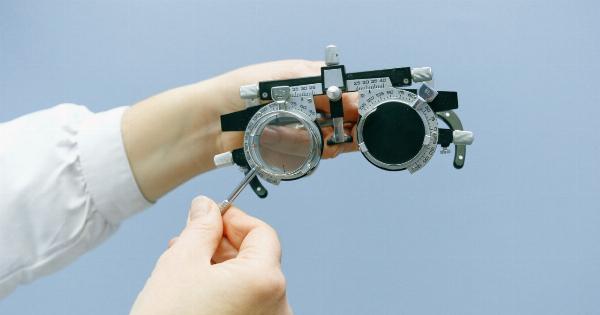Macular degeneration is a common eye condition that affects millions of people worldwide. It is a leading cause of vision loss and can greatly impact a person’s quality of life.
The condition mainly affects the macula, which is the central part of the retina responsible for sharp, detailed vision. If you suspect that you or a loved one may have macular degeneration, it is essential to seek professional medical advice for a proper diagnosis.
However, there are a few simple home tests you can perform to get an idea of whether you should be concerned. In this article, we will discuss some tips and tricks to help you get started with a quick macular degeneration home test.
1. Amsler Grid Test
The Amsler grid is a useful tool for detecting early signs of macular degeneration. It consists of a grid pattern with a central fixation point. To perform this test, follow these steps:.
– Wear your reading glasses or hold the grid at a comfortable reading distance.
– Cover one eye and focus on the central fixation point.
– Pay attention to the grid’s straight lines, their intersections, and the overall pattern.
– Repeat the test for the other eye.
– Note any distorted, blurry, or missing lines. These could indicate macular degeneration.
2. Dark Adaptation Test
Another home test to assess your macular function is the dark adaptation test. This test measures how well your eyes adjust to darkness. Follow these steps:.
– Ensure the testing area is completely dark.
– Relax for about 15-20 minutes to allow your eyes to adapt to the darkness.
– Cover one eye and expose it to a small light source (like a penlight) for a few seconds.
– Quickly cover the eye and start a stopwatch.
– Wait until you can see the light again, and stop the stopwatch.
– Repeat the test for the other eye.
– Compare the time taken for each eye’s macula to regain full sensitivity.
3. Visual Acuity Test
The visual acuity test is a simple yet effective way to assess your clarity of vision. To perform this test, you can use a Snellen chart or an online visual acuity test:.
– Stand or sit approximately 6 meters (20 feet) away from the chart or screen.
– Cover one eye and read the letters or symbols from the largest line possible.
– Repeat the test for the other eye.
– Note any difficulty in reading the small letters or symbols.
4. Color Vision Test
Macular degeneration can sometimes affect color vision. You can perform a color vision test at home using color plates:.
– Have good lighting in the room and ensure there is no glare on the plates.
– Start with a known set of color plates, such as the Ishihara color plates.
– Cover one eye and try to identify the numbers or patterns on the plates.
– Repeat the test for the other eye.
– Note any difficulty in identifying the numbers or patterns on specific plates.
5. Contrast Sensitivity Test
Contrast sensitivity refers to the ability to discern subtle differences in shades of gray. It can be affected by macular degeneration. You can perform a contrast sensitivity test at home using specialized charts:.
– Make sure the testing area is well-lit and free from glare.
– Cover one eye and stand or sit at a fixed distance from the chart.
– Read the letters or symbols on the chart, starting from the top.
– Repeat the test for the other eye.
– Note any difficulty in distinguishing the letters or symbols with low contrast.
6. Wavy Lines Test
One of the early signs of macular degeneration is seeing straight lines as wavy or distorted. You can perform a simple wavy lines test at home using printed lines:.
– Print or draw vertical lines on a sheet of paper, leaving small gaps between them.
– Cover one eye and focus on a specific point on the lines.
– Observe if any part of the lines appears wavy or distorted.
– Repeat the test for the other eye.
– Note any differences in the appearance of the lines between the eyes.
7. Daily Activities Assessment
In addition to specific tests, paying attention to your daily activities can provide valuable insights into any potential vision changes related to macular degeneration. Consider the following:.
– How is your reading ability? Do you often need brighter light or struggle with small print?.
– Do you notice any difficulty recognizing faces or reading signs at a distance?.
– Are you experiencing any blind spots or areas of reduced vision?.
– Do you see any distortions, such as straight lines appearing crooked?.
– Are you experiencing any changes in color perception?.
8. Seeking Professional Assessment
While home tests can provide preliminary indications of macular degeneration, it is crucial to consult an eye care professional for a comprehensive examination and proper diagnosis.
They have the expertise and equipment to accurately diagnose macular degeneration, assess its progression, and recommend suitable treatment options.
9. Lifestyle Tips to Support Macular Health
While you await professional assessment or in conjunction with your treatment plan, there are several lifestyle adjustments you can make to support macular health:.
– Follow a healthy diet rich in dark leafy greens, colorful fruits, and fish high in omega-3 fatty acids.
– Quit smoking and limit alcohol consumption, as these habits can have a negative impact on your eye health.
– Protect your eyes from harmful UV rays by wearing sunglasses with 100% UV protection when outdoors.
– Maintain a healthy weight and engage in regular physical activity to promote overall well-being.
– Stay diligent with routine eye exams, even if you experience no noticeable symptoms of vision changes.
10. Emotional Support
A diagnosis of macular degeneration can be overwhelming and emotionally challenging. It is essential to seek emotional support and connect with others who are also navigating through similar experiences.
Joining support groups or seeking counseling can help you cope with the emotional impact of vision changes and find effective ways to adapt to your new circumstances.
In conclusion, a quick macular degeneration home test can provide some initial insight into potential vision changes. However, it is essential to remember that these tests are not a substitute for professional medical assessment.
If you suspect macular degeneration or experience any concerning symptoms, consult an eye care professional for an accurate diagnosis and appropriate treatment plan.































